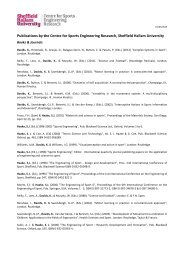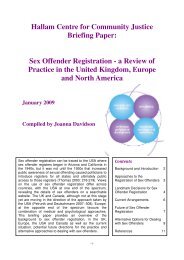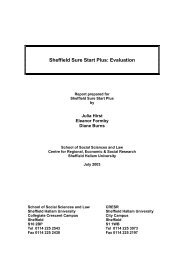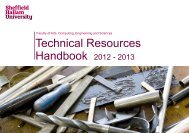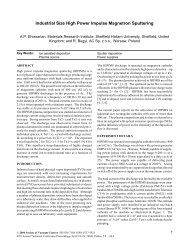The exercise of judicial discretion in rent arrears cases - Sheffield ...
The exercise of judicial discretion in rent arrears cases - Sheffield ...
The exercise of judicial discretion in rent arrears cases - Sheffield ...
Create successful ePaper yourself
Turn your PDF publications into a flip-book with our unique Google optimized e-Paper software.
also the most common explanation given by defendants for <strong>rent</strong> <strong>arrears</strong> <strong>in</strong> the 150 <strong>cases</strong><br />
exam<strong>in</strong>ed dur<strong>in</strong>g that research. <strong>The</strong> impact <strong>of</strong> these difficulties was acknowledged by district<br />
judges <strong>in</strong> that study, who considered that they led to unnecessary adjournments and repeat<br />
hear<strong>in</strong>g dates. One judge estimated that hous<strong>in</strong>g benefit issues were <strong>in</strong>volved <strong>in</strong> 40% <strong>of</strong><br />
<strong>rent</strong> <strong>arrears</strong> <strong>cases</strong>; another felt that the difficulties could “lead to the collapse <strong>of</strong> this court's<br />
ability to effectively list possession <strong>cases</strong>” (pp. 90-91). <strong>The</strong> study found that <strong>in</strong> Leicester<br />
County Court only 12% <strong>of</strong> the <strong>cases</strong> were adjourned at the first hear<strong>in</strong>g, compared to 64% at<br />
Wandsworth County Court, and suggested that these diffe<strong>rent</strong> outcomes were <strong>in</strong> part caused<br />
by lengthy hous<strong>in</strong>g benefit delays <strong>in</strong> <strong>cases</strong> <strong>in</strong>volv<strong>in</strong>g Lambeth LBC.<br />
<strong>The</strong> problems faced by, and caused by, the adm<strong>in</strong>istration <strong>of</strong> hous<strong>in</strong>g benefits are well<br />
known. For example, it accounted for 10% <strong>of</strong> the nearly 19,000 compla<strong>in</strong>ts made to the<br />
Local Government Ombudsman <strong>in</strong> 2003/04 (Local Government Ombudsman, 2004).<br />
However, efforts made to improve the system seem to be hav<strong>in</strong>g some effect. Statistics<br />
from the Department <strong>of</strong> Work and Pensions <strong>in</strong>dicate that more councils are reach<strong>in</strong>g the<br />
government’s targets; the average number <strong>of</strong> days reported by local authorities for<br />
process<strong>in</strong>g new claims (for which the target is 14 days) has reduced from 55 days <strong>in</strong><br />
2002/03, to 49 days <strong>in</strong> the fourth quarter <strong>of</strong> 2003/04. But clearly a number <strong>of</strong> local<br />
authorities are fail<strong>in</strong>g to process new claims with<strong>in</strong> 8 weeks, which has serious<br />
consequences for <strong>arrears</strong> <strong>cases</strong> based on the mandatory Ground 8 (see Chapter 8, below).<br />
However, <strong>in</strong> answer to the question whether county courts might be given <strong>discretion</strong> <strong>in</strong> such<br />
<strong>cases</strong> where the <strong>rent</strong> <strong>arrears</strong> resulted from a delay or failure to pay hous<strong>in</strong>g benefit, the<br />
Hous<strong>in</strong>g M<strong>in</strong>ister Keith Hill responded that the Office <strong>of</strong> the Deputy Prime M<strong>in</strong>ister had no<br />
plans to amend Ground 8, <strong>in</strong> view <strong>of</strong> the improv<strong>in</strong>g performance <strong>of</strong> local authorities <strong>in</strong><br />
adm<strong>in</strong>ister<strong>in</strong>g hous<strong>in</strong>g benefit (Hansard, 12 July 2004: Column 876W).<br />
In this chapter we consider the impact <strong>of</strong> hous<strong>in</strong>g benefit under the follow<strong>in</strong>g head<strong>in</strong>gs:<br />
F<strong>in</strong>d<strong>in</strong>gs from the data on recorded <strong>cases</strong><br />
Judges’ view and knowledge <strong>of</strong> hous<strong>in</strong>g benefit<br />
Hous<strong>in</strong>g benefit as a factor <strong>in</strong> determ<strong>in</strong><strong>in</strong>g reasonableness and type <strong>of</strong> order<br />
Responses <strong>of</strong> judges to hous<strong>in</strong>g benefit scenario<br />
F<strong>in</strong>d<strong>in</strong>gs from data on the recorded <strong>cases</strong><br />
Here we draw on data from 530 <strong>cases</strong> where the outcome <strong>of</strong> the first hear<strong>in</strong>g was recorded.<br />
This is the number <strong>of</strong> such <strong>cases</strong> where we can be sure that the researcher recorded<br />
whether or not hous<strong>in</strong>g benefit was noted as an issue. In 121 <strong>cases</strong> the issue <strong>of</strong> hous<strong>in</strong>g<br />
76



